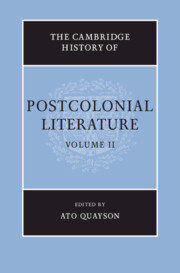Book contents
- Frontmatter
- 21 The language question in India and Africa
- 22 English and the development of postcolonial literature
- 23 Religion and postcolonial writing
- 24 Postcolonial responses to the Western canon
- 25 Island writing, Creole cultures
- 26 Magical realism
- 27 Palimpsest and hybridity in postcolonial writing
- 28 The narrative forms of postcolonial fiction
- 29 Poetry and postcolonialism
- 30 Primitivism and postcolonial literature
- 31 Popular culture and postcolonial literary production in Africa and India
- 32 Film and postcolonial writing
- 33 Fanon, Memmi, Glissant and postcolonial writing
- 34 Negritude and postcolonial literature
- 35 Publishing, prizes and postcolonial literary production
- 36 Key journals and organizations
- Bibliography
- Index
- References
26 - Magical realism
Published online by Cambridge University Press: 28 January 2012
- Frontmatter
- 21 The language question in India and Africa
- 22 English and the development of postcolonial literature
- 23 Religion and postcolonial writing
- 24 Postcolonial responses to the Western canon
- 25 Island writing, Creole cultures
- 26 Magical realism
- 27 Palimpsest and hybridity in postcolonial writing
- 28 The narrative forms of postcolonial fiction
- 29 Poetry and postcolonialism
- 30 Primitivism and postcolonial literature
- 31 Popular culture and postcolonial literary production in Africa and India
- 32 Film and postcolonial writing
- 33 Fanon, Memmi, Glissant and postcolonial writing
- 34 Negritude and postcolonial literature
- 35 Publishing, prizes and postcolonial literary production
- 36 Key journals and organizations
- Bibliography
- Index
- References
Summary
As it is the case with most keywords, critical discussions of magical realism should not avoid asking questions about the history, geography and cultural politics of the concepts and practices at stake in such examinations. When was the concept of magical realism articulated? Is magical realism a Latin American or a universal aesthetic form? And what is the cultural, historical and political relation of magical realism with the discourse of postcolonialism? Scholars are in general agreement about the facts, but often differ on how to interpret them. How can we make sense of the fact that the first critic to think about magical realism as an aesthetic category was a German art critic, Franz Roh (1890–1965), and not the Latin Americans Arturo Uslar Pietri (1906–2001) and Alejo Carpentier (1904–60)? What does this transatlantic (pre)history of the concept of magical realism say about the particularist (peripheral, Third World, postcolonial) claims or universalist inscriptions of this narrative form? Answers to these questions vary, but what seems to be missing in the vast bibliography on magical realism that started growing exponentially since the mid 1980s is a historical narrative of how magical realism was transformed from a narrowly defined concept capable of explaining the scope of post-expressionist painting in Franz Roh; to the aesthetic that was supposed to define the Latin American cultural difference in Uslar Pietri and Carpentier, and later in Gabriel García Márquez (b. 1927); to finally come to be seen, as Homi Bhabha suggested, as ‘the literary language of the emergent postcolonial world’. This chapter will trace the transcultural genealogy of a critical concept and aesthetic form through its various articulations prior to its becoming the highly celebrated postcolonial form we know today.
- Type
- Chapter
- Information
- The Cambridge History of Postcolonial Literature , pp. 833 - 868Publisher: Cambridge University PressPrint publication year: 2012
References
- 9
- Cited by



